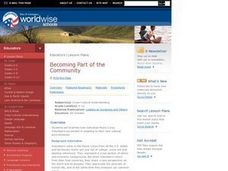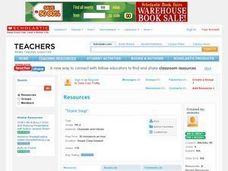Curated OER
Identify the Three Economic Sectors
Students identify the three economic sectors found in the United States. They organize different foundations into these three categories. They examine why each sector is necessary in our society.
Curated OER
Africa Colors a Destiny
Students discover the peace corps and the culture of Chad. In this cultural awareness lesson, students watch a slide show and examine various primary sources from peace corps volunteers in Africa. This lesson includes web-links,...
Curated OER
Micro-finance Challenge
Young scholars play a micro-finance game. in this global economy lesson, students play a game that assists them in concepts of micro-finance. Young scholars will also watch a business development video and explore additional resources.
Curated OER
Becoming Part of the Community
Students identify how various cultures are similiar. As a class, they read an essay of a Peace Corps volunteer being integrated into their new community. In groups, they take the elements from the story and put them into different...
Curated OER
Who, What, Where, When, and Why
Learners explain the concepts of market system, command and mixed economy. They describe the differences between needs and wants. They compare and contrast different government and economic systems.
Polar Bears International
Taking Action!
Motivate young scientists to stand up and take action with this environmental science instructional activity. To begin, the class works in small groups brainstorming actions that support the conservation of the earth before creating and...
Curated OER
How to Clean Up An Oil Spill
Students practice cleaning up an oil spill. In this good citizenship instructional activity, students experiment with different cleaning agents to see which ones clean oil off a soft toy. They compare this experiment with the volunteers...
Curated OER
Fortunes and Wealth
Students work together to examine how Americans acquired their fortunes. They compare and constrast the different levels of wealth. They discuss the power that wealth can bring as well.
Curated OER
Political Reform in the Late 1800s
Eleventh graders examine the type of political reform in the 1800s. In groups, they analyze the Pendleton Civil Service Act and two other economic acts. To end the lesson plan, they take a quiz and discuss the impact of the acts on the...
Curated OER
Oysters: Impacts on Bay and Economy
Middle schoolers are able to understand the history and economic impact of the oyster, as well as its function in the St. Mary's River Ecosystem. They are provided live specimen for each student to investigate and touch. Students are...
Carolina K-12
Preventing Voter Fraud or Encouraging Voter Suppression?
The issues of voter fraud and voter suppression are relevant in every election, local as well as national. Soon-to-be voters learn about a recent bill proposed in North Carolina, the Voter Information and Verification Act, and decide for...
Curated OER
Government and Parliament
Twelfth graders discover how the government works in the United Kingdom and the functions of the Parliament. They hold a mock election and campaign.
Curated OER
The World In My Community
Learners identify products in their community which are imported from other countries. After conducting a personal household survey, students research the product's country of origin. They discover the role imports have upon their...
Curated OER
Stone Soup
Students explain how various cultures affect the interactions that take place in a community. They compare and contrast families by where they live, the jobs they hold and the types of food they eat. Using examples, they sort goods and...















